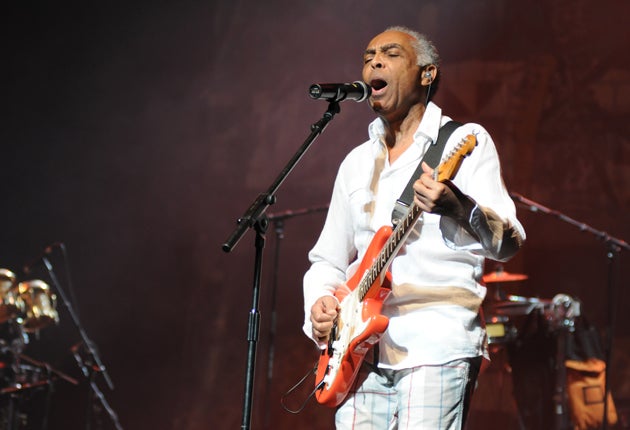Gilberto Gil, Royal Festival Hall, London

A veteran artist has a history. And, it could be argued, a responsibility.
So although Gilberto Gil, a bonafide legend of Brazilian music, has the audience in the palm of his hand from the moment he brings his enviably lithe, 68-year-old self on stage, there is a moment that borders slightly on dissent halfway into proceedings. The problem is that he has some four decades of anthems behind him, several of which were catalysts of the revolutionary Tropicalismo movement of the late 60s, the time when samba and bossa nova got their freak on with Western rock chords, surrealist imagery and anti-establishment attitudes that got Gil kicked out of the country by the military dictatorship.
He wrote enduring tunes while on an enforced "holiday" in London in the 70s and afterwards, and that's what the faithful has come to hear. However, Gil asks them to indulge his desire to play the forró style featured on his new album, Fé Na Festa, and after a volley of half-hearted heckling, which sounds more seductive than aggressive in Portuguese, the artist triumphs. The reward is that forró, hailing from the north east of Brazil, is a vibrantly upbeat folk style partially derived from Irish fiddle music as well as samba. It's a nimble Afro-jig. And it's brought to life by a brilliant six-piece band in which percussion, accordion and violin create a barrage of speedy lines while the guitar of Sergio Chiavazzoli curls intricate countermelodies around Gil's plaintive but sharply projected vocal. What makes the music even more rousing is the singer's hearty dance steps, which add a crisp sexiness to his languid charm. Difficult as it is to resist the joyous, festive nature of forró, the set does sag a touch around the three quarter mark. It was at that point that Gil could have rolled out a classic or two. The blip was momentary though, and he finished with the stinging "Asa Branca", an emblematic piece by forró godfather Luiz Gonzaga. It made up for the absence of "Toda Menina Baiana". That was my tune.
Subscribe to Independent Premium to bookmark this article
Want to bookmark your favourite articles and stories to read or reference later? Start your Independent Premium subscription today.

Join our commenting forum
Join thought-provoking conversations, follow other Independent readers and see their replies